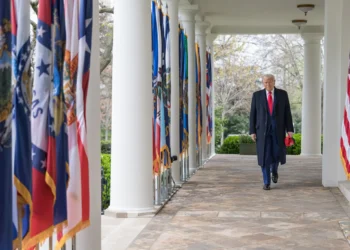In a comprehensive interview with GBN News in May 2024, Steve Bannon boldly declared, “We’re unlovable, and we’re proud of it,” encapsulating his defiance against the political establishment and his firm belief in the populist movement’s potency.
This sentiment epitomizes his portrayal of populist nationalists as outsiders willing to challenge entrenched power structures, even if it means being ostracized by mainstream society.
During the interview, Bannon discussed the historical context of technological advancements preceding wars, citing the surprise and upheaval that often accompany major conflicts. He drew parallels to the outbreak of World War I, which saw significant technological innovations like machine guns, artillery, submarines, and airplanes alter the nature of warfare and catch many off guard.
THIS IS WHY AI IS A GREAT CONCERN OF HIS
Expressing apprehension about the contemporary technological landscape, Bannon voiced concerns about rapid advancements in areas such as artificial intelligence, tactical nuclear weapons, biological warfare, and pandemic control. He warned that these developments and geopolitical tensions mirror the conditions preceding past conflicts, potentially leading to catastrophic consequences if not properly managed.
Bannon directed sharp criticism towards the Conservative Party of Britain, accusing them of betraying their voters on key issues like immigration. He compared them to establishment Republicans in the US, whom he believes have failed to address people’s concerns effectively. Drawing parallels between the struggles of the UK and the US with globalization and immigration, he recognized the shared civilization between the two nations.
Highlighting Boris Johnson’s handling of Brexit, Bannon criticized abandoning the campaign’s populist spirit and pointed to a broader trend across Europe where elites consistently disregard public opposition to mass immigration. He predicted a significant political shift in Britain, forecasting a Tory wipeout due to their failure to deliver on immigration promises. He suggested that only a true populist nationalist party could address voter concerns.
Bannon lamented the restrictive speech laws in the UK, contrasting them with the US where alternative media played a crucial role in Trump’s rise. He argued that the European political class, including populist parties, had failed to deliver due to their need to make mainstream accommodations. Bannon defended Trump’s approach in the US, highlighting the deep state and establishment Republican opposition as significant obstacles during his presidency.
Furthermore, Bannon’s remarks revealed his belief in the stolen 2020 election and his analysis of political backroom advisors like Dominic Cummings. He praised Cummings for his effectiveness during the 2019 UK election. He criticized the current economic state of the UK, advocating for a restructuring towards entrepreneurial capitalism to avoid a violent revolution.
Bannon’s comments in the interview articulated his call for a populist, nationalist approach to politics, alongside his critique of elite handling of historical and contemporary events, painting a vivid picture of his worldview and political agenda- and his understanding of the history of society, culture, and wars does go back very far.
WHEN BANNON TALKS ABOUT SALTING THE EARTH LIKE CARTHAGE
“Salt the Earth like Carthage” is an idea often attributed to the Roman Senate during the Punic Wars, particularly the Third Punic War (149–146 BCE). It signifies the destruction of Carthage, a rival city-state of Rome. After besieging Carthage for three years, the Romans finally breached its walls, razed the city to the ground, and sold its surviving inhabitants into slavery. This brutal act was intended to eliminate any future threat from Carthage and to serve as a warning to other potential adversaries. The phrase encapsulates the ruthlessness and uncompromising nature of ancient warfare and conquest.
Bannon refers to that battle against the Administrative State, which some could describe as a shadow government.
WHEN BANNON TALKS ABOUT POPULISM
Populist movements historically arise from a dissonance between the ruling class’s narratives and the populace’s lived experiences. When the elite portrays an image of progress and stability, but ordinary people face economic hardship, social inequality, and political disenfranchisement, frustration mounts.
This gap fuels populist rhetoric, which amplifies genuine grievances and promises to represent the authentic voice of the people against a detached, often perceived as corrupt, establishment.
Such movements reflect a profound disconnect, where the ruling class’s reassurances fail to address or acknowledge the everyday struggles and aspirations of the broader population, sparking demands for radical change and reformed representation.
WHEN BANNON TALKS ABOUT LENINISM
The Bolsheviks and the Kulaks represent opposing sides in early Soviet history, particularly during the Russian Revolution and subsequent civil war.
Bolsheviks:
The Bolsheviks were a faction of the Russian Social Democratic Labor Party (RSDLP) led by Vladimir Lenin. They believed in a radical, revolutionary approach to overthrowing the existing bourgeois government and establishing a proletarian dictatorship. The Bolsheviks played a crucial role in the October Revolution of 1917, which led to the overthrow of the Provisional Government and the establishment of Soviet Russia. Their policies included land redistribution, nationalization of industry, and the creation of a centralized, state-controlled economy.
Kulaks:
The term “Kulaks” referred to wealthier peasants in Russia who owned larger farms and had more resources than the average peasant. They were often seen as more prosperous and were sometimes involved in hiring labor or renting out land. During the early Soviet period, the Bolsheviks viewed the Kulaks as class enemies because they were seen as a barrier to socialist reforms, particularly collectivization. The Soviet government under Joseph Stalin initiated a campaign against the Kulaks in the late 1920s and early 1930s, aiming to eliminate them as a class. This campaign, known as “dekulakization,” involved expropriation of their land, forced collectivization, and often resulted in deportation, imprisonment, or execution.
Conflict:
The conflict between the Bolsheviks and the Kulaks was a broader struggle between revolutionary socialist policies and traditional agrarian interests. The Bolshevik agenda sought to dismantle the existing social and economic structures that allowed the Kulaks to thrive, while the Kulaks resisted these changes to maintain their financial status and way of life. This clash resulted in significant social upheaval, contributing to widespread famine and suffering in rural areas during collectivization.
WHEN BANNON TALKS ABOUT MAGA
Bannon likened the MAGA movement to the kulaks, who resisted collectivization policies under Stalin’s regime. He drew parallels between the kulaks’ resilience and defiance against oppressive government measures and the grassroots movement embodied by MAGA supporters, who he believes are similarly resisting the encroachment of what he sees as oppressive globalist policies.
By comparing the two, Bannon suggests that like the kulaks, the MAGA movement represents a powerful force of resistance against perceived tyranny and oppression.
For more context watch the whole interveiw:





Trump is being tried by CCP China through Leticia James and her Bureau chief Karin kunstler and so is miles guo !!!!
THIS shows that CCP CHINA Can Have Influencing on New York State Judiciary !!!!!
https://www.pli.edu/faculty/karin–kunstler-goldman-i918714
Monkey Werx says WAR Coming and Draft in UK NATO Countries and USA
https://www.youtube.com/watch?v=lH6G2M2igIA